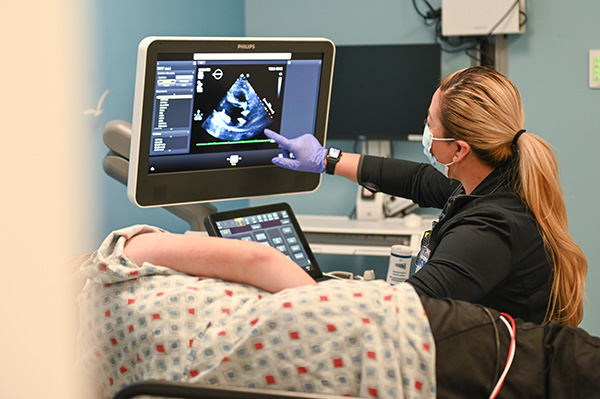Fetal Diagnostic Testing

Pregnancy can be a time filled with unknowns, but proper information and understanding helps. If your doctor has recommended fetal diagnostic testing, or if you’ve recently received a fetal diagnosis, you are likely feeling a range of unexpected emotions. On this page, we break down different types of testing you may encounter during your pregnancy and provide answers to common questions.
Fetal diagnostic tests screen for a range of disorders to help identify problems that can affect a pregnancy or unborn babies. At The Fetal Care Center of Southern California we conduct prenatal diagnostic tests to confirm and understand your baby’s diagnosis. Based on the diagnosis, we will provide you with condition education, counseling, treatment, planning and after-birth care. Our goal is to answer all your questions and relieve some of the anxiety about your baby’s diagnosis. All appointments will take place in one location on the CHOC campus and our nurse coordinator will be your single point of contact and will coordinate all your care to make things as easy as possible. At CHOC, we are with you every step of the way.
What You Will Learn
You’ll learn the different fetal diagnostic tests conducted during pregnancy to identify potential complications.
- How Do I Know if I Need a Fetal Diagnostic Test?
- Prenatal Screening vs Diagnostic Testing: What is the Difference?
- What Are the Main Benefits of Prenatal Testing?
- What Are the Risks of Prenatal Diagnostic Testing?
- Fetal Ultrasound
- Fetal MRI
- Fetal Echocardiogram
- Genetic Testing
- Doppler
- Nuchal Translucency
- The Fetal Care Center of Southern California
- Fetal Care Diagnostic Testing FAQ
How Do I Know if I Need a Fetal Diagnostic Test?
Most often, a prenatal screening test is done first through your obstetrician’s office. Screening tests are optional but will be the first step to indicate whether you may need additional diagnostic testing. If your screening test shows a high risk for an abnormality, your doctor will typically recommend a fetal diagnostic test. The Fetal Care Center can help walk you through these decisions.
It is up to you to decide if you want to pursue prenatal screening or diagnostics tests. Ask yourself how you will feel about the possible results, what you would do with the information you receive and whether it will help inform the care you seek during pregnancy. Take time to decide what you are comfortable with, and talk with your provider about what feels best for you and your family..
Prenatal Genetic Screening vs Diagnostic Testing: What is the Difference?
Prenatal genetic screening tests measure the possibility of a baby having a particular disorder or condition; they cannot diagnose. Unlike screening tests, diagnostic tests are used to confirm whether a birth defect or similar diagnosis are present.
What Are the Main Benefits of Prenatal Testing?
The main benefits of prenatal testing are:
- Early detection of potential issues that could affect your baby
- The ability to make informed medical decisions
- Time to plan ahead if a condition is diagnosed
- Help determining where to give birth if specific medical care or equipment are needed
- To ease anxiety or concerns if a condition or birth defect are ruled out
What Are the Risks of Prenatal Diagnostic Testing?
Some of the risks of prenatal diagnostic tests include:
- Some diagnostic tests, like amniocentesis and chorionic villus sampling, have a very small risk of miscarriage.
- Positive test results may cause you to feel upset, stressed or overwhelmed.
- An inaccurate result. Note that the risk of an inaccurate result, such as a false positive or false negative, is extremely low. Your doctor can discuss the accuracy rates of tests with you.
Types of Fetal Diagnostic Tests
Fetal Ultrasound
An ultrasound is a non-invasive exam that uses sound waves to create images of the baby in utero. They are a routine part of prenatal care and are a low-risk procedure that provides information on the unborn baby like defects, growth and gestational age. Ultrasounds do not use radiation, so the test is safe for the baby. Utilizing a hand-held tool called a transducer on the abdomen or vaginally, sound waves are sent through the body that bounces off the baby. The ultrasound machine then creates digital images showing the heart, head, spine and other parts. A radiologist will review the photos to discover and diagnose any present medical conditions.
Fetal MRI
Fetal Magnetic Resonance Imaging (MRI) uses a magnetic field and radio waves to evaluate any abnormal structures like the brain, spine, neck, chest and more. An MRI may be recommended to get more detailed images if, for example, ultrasound results are inconclusive. Like an ultrasound, a fetal MRI does not expose your baby to radiation and is painless. As there isn’t a way to keep your baby from moving around in the womb, this is an ultrafast MRI. images are captured using a snapshot technique.
Fetal Echocardiogram
Fetal echocardiogram, also referred to as fetal echo, is a high-resolution ultrasound test to evaluate heart structures and functions, and to diagnose cardiac abnormalities. This procedure is painless and non-invasive. Using similar equipment to ultrasounds, a transducer is placed over the mother’s abdomen to obtain detailed images of the structure, blood flow and cardiac rhythm of the baby’s heart. Sound waves echo off the heart structures and the transducers send them to the computer. The computer then interprets the echoes into images of the heart walls and valves. A fetal echo allows for faster medical and surgical intervention as early diagnosis is important for babies who may be at risk for congenital heart defects, heart failure or rhythm disturbances.
Genetic Testing
Many genetic disorders can be diagnosed prenatally. There are various genetic tests to detect birth defects and chromosome abnormalities, like Down syndrome and spina bifida. Examples of genetic tests include genetic blood tests, chorionic villus sampling (CVS) and amniocentesis. CVS obtains a transabdominal or transcervical sample. For a transcervical sample, a catheter is inserted through the cervix into the placenta, whereas for a transabdominal sample, a needle is inserted through the abdomen and uterus into the placenta. Amniocentesis is guided by ultrasound and is used to gather a sample of amniotic fluid by inserting a thin needle into the abdominal wall and uterus.
Doppler Ultrasound
Doppler ultrasounds measure blood circulation, including the umbilical cord, brain, liver, and heart. Utilizing sound waves, the transducer detects movement in blood vessels. In a high-risk pregnancy, a doppler can be used when a suspected abnormality can affect the blood flow like fetal cardiac abnormalities, growth restriction, and maternal conditions like chronic hypertension.
Nuchal Translucency
The nuchal translucency test uses an abdominal ultrasound to measure the nuchal fold tissue at the back of the baby’s neck. Measuring the thickness of the nuchal fold helps assess the risk for genetic issues like Down syndrome, Turner syndrome, and neural tube defects. All fetuses have fluid at the back of their neck, but those with more fluid result in a thicker nuchal fold.
The Fetal Care Center of Southern California

If an abnormality is detected before your baby is born, our team of pediatric experts at the Fetal Care Center of Southern California can confirm your baby’s diagnosis, provide extensive condition education and counseling, and begin comprehensive treatment planning for after your baby’s birth.
Fetal Care Diagnostic Testing FAQ
Read more frequently asked questions about fetal care.













